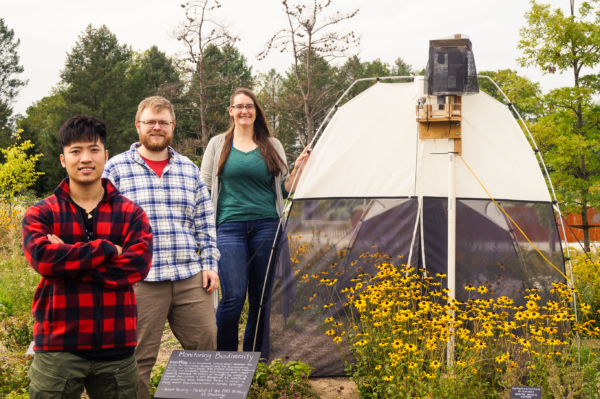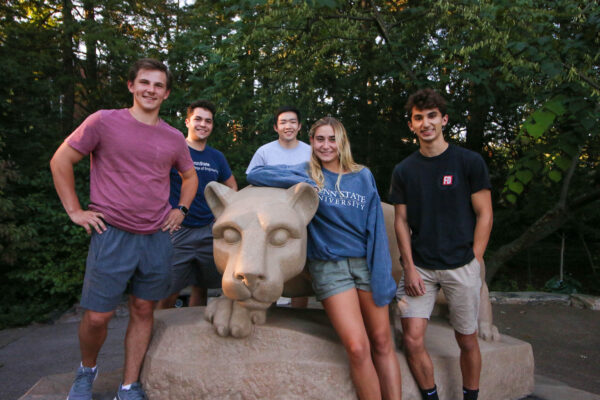Phase Three Winners
Two teams have been awarded funding in the final phase of the Nittany AI Challenge.
InsectEye— $15,000 Winner
 InsectEye is an AI–based, nonlethal insect trap and identification system to assist entomologists in understanding insect biodiversity. To see InsectEye up close, you can visit the Pollinator Garden in The Arboretum at Penn State.
InsectEye is an AI–based, nonlethal insect trap and identification system to assist entomologists in understanding insect biodiversity. To see InsectEye up close, you can visit the Pollinator Garden in The Arboretum at Penn State.
Team Members
- Nelson Daniel Troncoso Aldas*
- Zeinab Hakimi*
- Eric Homan
- Chonghan Lee*
- Codey Mathis
- Viet Pham
*Not pictured.
AIPR — $10,000 Winner
 AIPR is AI–powered recycling, a solution aiming to limit contamination by sorting materials using machine learning to make recycling more efficient and economical.
AIPR is AI–powered recycling, a solution aiming to limit contamination by sorting materials using machine learning to make recycling more efficient and economical.
Team Members
- Alex Baptista
- Avi Bewtra
- Erica DiCarlo
- Patrick Elisii
- Matthew So
Phase Two Winners
Ten teams have been awarded $1,500 and will move forward to compete in the Minimum Viable Product (MVP) Phase. MVP submissions are due September 9, 2021, and the winners will be announced on September 28.
- AIPR — Solution aiming to limit contamination by sorting materials using machine learning to make recycling more efficient and economical
- Briefly — Smart summarizer tool that extracts meaningful information from text, audio, and video source to aid students with online learning
- BuriedDeep ML — Simultaneous Localization and Mapping (SLAM) robot used to locate valuable metals in a landfill that can be recycled, ultimately reducing waste
- InsectEye — AI–based insect trap and identification system to assist entomologists in understanding insect biodiversity
- Psy Space — AI utilized through a mobile and web application to provide support that can ease short-term distress and identify mental health conditions in the absence of a health care professional on site
- Reconnect — AI to identify phone addiction by recognizing excess screen time, presenting user with an alternative, real-world activity to try in its place
- Table Rock Markets — E-commerce platform designed to keep farms in business by increasing sales and profitability, while helping families eat healthy, locally grown food
- The Mental Health Project — Software designed for mental health professionals to provide diagnostics, treatment and to identify patients who may be hard to treat by aggregating initial self-reported data
- Trace — Urban growth monitoring solution to provide cities with data to better assist in preparation for natural disasters
- TwinnR — AI–driven solution to access data and better provide smart manufacturing solutions
Phase One Winners
Twenty teams have been awarded $500 and will move forward to compete in the Prototype Phase. Teams have submitted initial ideas to promote AI for Good through education, environment, health, and humanitarianism.
-
Abundant Connections — Reduce annual food waste by using computer simulation, machine learning, and web development to monitor food waste in communities and connect with those in need of food
-
AIPR — Solution aiming to limit contamination by sorting materials using machine learning to make recycling more efficient and economical
-
Briefly — Smart summarizer tool that extracts meaningful information from text, audio, and video source to aid students with online learning
-
BuriedDeep ML — Simultaneous Localization and Mapping (SLAM) robot used to locate valuable metals in a landfill that can be recycled, ultimately reducing waste
-
Bytehealth — AI used to prevent depression though a multifaceted data acquisition and analysis system
-
CVID — Website that provides information about specific areas in the United States and the need for the COVID-19 vaccines
-
Fifth Sense — AI–based live sound-transcription mobile application for the hearing impaired
-
Food Aid — AI–based program to help food banks meet nutritional needs for the population they serve
-
Ground Up — Reduce the environmental impact of meat production by using AI to predict combinations of plant-based products to mimic ground meat
-
InsectEye — AI–based insect trap and identification system to assist entomologists in understanding insect biodiversity
-
PocketLawyer — Mobile application using AI to identify emotive words that will trigger automatic recordings on smart phones for use in instances of domestic abuse or abuse of power situations
-
Psy Space — AI utilized through a mobile and web application to provide support that can ease short-term distress and identify mental health conditions in the absence of a health care professional on site
-
RA.I.se — AI imagery and temperature screening robotic system for automated body temperature monitoring of construction workers
-
Reach.AI — AI to analyze public data in rural Pennsylvania to bridge racial and ethnic health inequity and disparity
-
Reconnect — AI to identify phone addiction by recognizing excess screen time, presenting user with an alternative, real-world activity to try in its place
-
StartUP — AI–based platform which enables users to interact with tools that work to inform the entrepreneur to make better business decisions and avoid costly mistakes
-
Table Rock Markets — E-commerce platform designed to keep farms in business by increasing sales and profitability, while helping families eat healthy, locally grown food
-
The Mental Health Project — Software designed for mental health professionals to provide diagnostics, treatment and to identify patients who may be hard to treat by aggregating initial self-reported data
-
Trace — Urban growth monitoring solution to provide cities with data to better assist in preparation for natural disasters
-
TwinnR — AI–driven solution to access data and better provide smart manufacturing solutions
